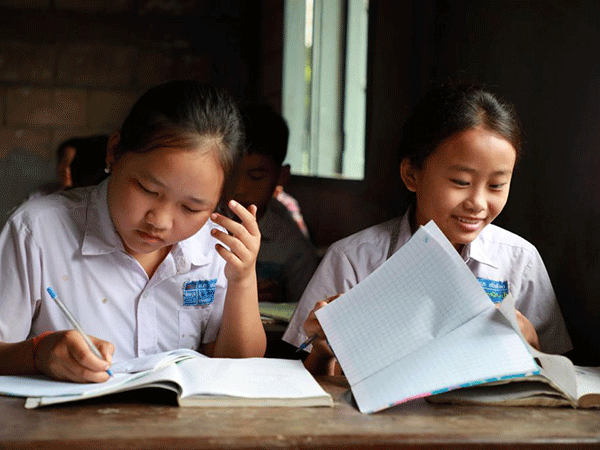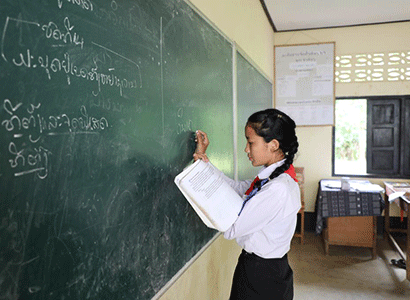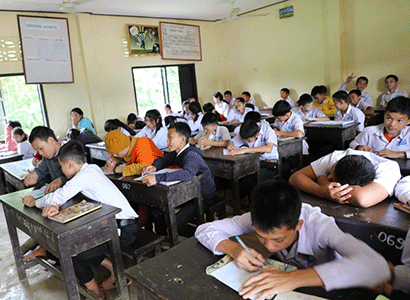 |
| Miss Karyia Lee (left) is one of 120 students who received support from the British Embassy and World Vision to continue with her secondary education last year. She says: “My dream is to become a medical staff to treat patients in my community. I want them to have a better life free from diseases.” |
International Day of Education:
Why Conditional Education Assistance
is a worthy investment for Laos’ future
Today marks the fifth International Day of Education. This year’s theme - “to invest in people, prioritise education” - highlights the urgent need to focus on education as a way to accelerate progress towards the completion of the Sustainable Development Goals.
In Lao PDR, while the education system has recorded significant progress in the past decades, reaching 98.7 percent of net enrollment in primary schools (2017), some concerning gaps still need to be filled to ensure the quality of education needed by children to reach their full potential. Recent assessments from the Lao Ministry of Education and Sports show that only 1 in 3 children meet literacy standards after Grade 3 and that more than 30 percent of children don’t transition to lower-secondary school. These national numbers hide important disparities between urban and rural areas, with children from rural communities more affected. With increasing economic struggles facing Lao people, lack of infrastructure, and proper transportation to reach secondary schools in remote areas, the deprivation of education has direct consequences for children, especially for girls who face higher risks of early child marriage and pregnancy.
The conditional education assistance, an investment for the future.
Fortunately, solutions exist. Recent research from World Vision shows that cash-based conditional education assistance (CEA) has proven to have a positive impact on children from remote areas to transition from primary to lower-secondary school and complete the compulsory eight years of education (from age 6 to 15) promoted in Laos. Over the past three academic years (2019-2021) and in partnership with the Ministry of Education and Sports, the British Embassy, and with private funds from Taiwan, World Vision piloted a targeted intervention to improve educational outcomes by providing cash assistance to 220 vulnerable children to start their first year of lower secondary school. The pilot was implemented in Pak Ou district, Luang Prabang province, where secondary-school enrollment rate is one of the lowest in the country.
 |
 |
After surveying 254 participants, including children benefitting from the CEA, parents, teachers, village and district authorities, it has been found that:
• The number of disadvantaged children transitioning to lower secondary school increased, with an enrollment rate of 92.7 percent children in the target villages against 68 percent for the whole district (academic year 2020-21);
• CEA brings sustainable behavior changes for children’s education, with 98 percent of the recipients more motivated to study than before and 95 percent of parents willing to support their children the following years even without conditional assistance;
• CEA intervention directly reduces the likelihood of early marriage, with 94 percent of caregivers of children who received support now considering that secondary education is more important than getting married;
• Gender inequalities still challenge girls to study at home, with 72 percent of girls surveyed spending more than 1 hour with house chores, compared to 34 percent of boys.
Inclusive and integrated education for greater impact.
The encouraging data highlights the need for joint efforts to address educational gaps, to increase the use of holistic approaches inclusive of all the education stakeholders and, to develop a shared vision that education is a continuing process that is not only confined to the classroom. The CEA intervention conducted by World Vision complemented continuing education programming that engages the participation of parents and caregivers, enhances the teachers’ and relevant district authorities’ capacities, trains village education volunteers to support students after class, and focuses on child-centered teaching approach in the class.
“The results of the research show that awarding CEA helped the students to have confidence in continuing to high school until graduation. With the combination of this intervention to our education programming, we are very proud to see the change in the attitude towards longer education and reducing early child marriage,” says Savivanh Vongxaiya, Education and Early Child Development Coordinator for World Vision International - Lao PDR.
World Vision’s new country strategy, retains a commitment to ensuring that more children achieve good learning outcomes, and conditional education assistance is one of the solutions to make it happen. With this intervention, vulnerable children are given a bigger chance at a brighter future and increase their possibilities to break the cycle of poverty, not only for themselves but also for their family, their community, and ultimately for their country.
To learn more about World Vision’s intervention in Laos, follow the Facebook page and visit the website.
By Advertorial Desk
(Latest Update January 24, 2023)
|